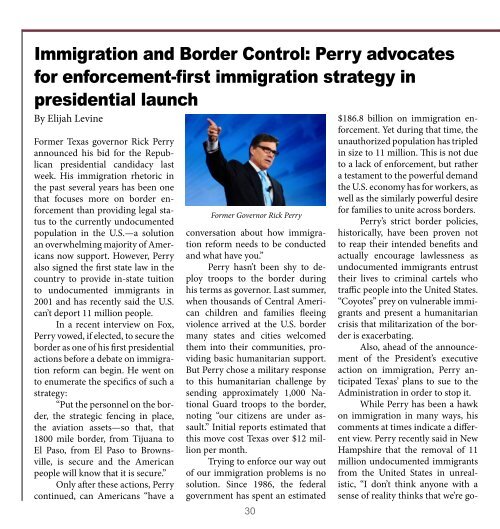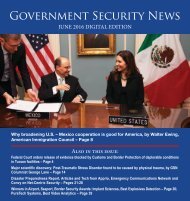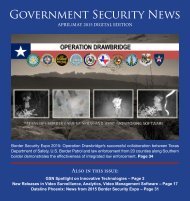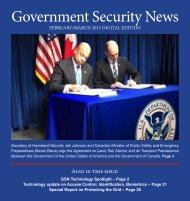Government Security News
Create successful ePaper yourself
Turn your PDF publications into a flip-book with our unique Google optimized e-Paper software.
Immigration and Border Control: Perry advocates<br />
for enforcement-first immigration strategy in<br />
presidential launch<br />
By Elijah Levine<br />
Former texas governor Rick Perry<br />
announced his bid for the Republican<br />
presidential candidacy last<br />
week. His immigration rhetoric in<br />
the past several years has been one<br />
that focuses more on border enforcement<br />
than providing legal status<br />
to the currently undocumented<br />
population in the U.S.—a solution<br />
an overwhelming majority of americans<br />
now support. However, Perry<br />
also signed the first state law in the<br />
country to provide in-state tuition<br />
to undocumented immigrants in<br />
2001 and has recently said the U.S.<br />
can’t deport 11 million people.<br />
in a recent interview on Fox,<br />
Perry vowed, if elected, to secure the<br />
border as one of his first presidential<br />
actions before a debate on immigration<br />
reform can begin. He went on<br />
to enumerate the specifics of such a<br />
strategy:<br />
“Put the personnel on the border,<br />
the strategic fencing in place,<br />
the aviation assets—so that, that<br />
1800 mile border, from tijuana to<br />
El Paso, from El Paso to Brownsville,<br />
is secure and the american<br />
people will know that it is secure.”<br />
only after these actions, Perry<br />
continued, can americans “have a<br />
Former Governor Rick Perry<br />
conversation about how immigration<br />
reform needs to be conducted<br />
and what have you.”<br />
Perry hasn’t been shy to deploy<br />
troops to the border during<br />
his terms as governor. Last summer,<br />
when thousands of Central american<br />
children and families fleeing<br />
violence arrived at the U.S. border<br />
many states and cities welcomed<br />
them into their communities, providing<br />
basic humanitarian support.<br />
But Perry chose a military response<br />
to this humanitarian challenge by<br />
sending approximately 1,000 National<br />
guard troops to the border,<br />
noting “our citizens are under assault.”<br />
initial reports estimated that<br />
this move cost texas over $12 million<br />
per month.<br />
trying to enforce our way out<br />
of our immigration problems is no<br />
solution. Since 1986, the federal<br />
government has spent an estimated<br />
$186.8 billion on immigration enforcement.<br />
Yet during that time, the<br />
unauthorized population has tripled<br />
in size to 11 million. This is not due<br />
to a lack of enforcement, but rather<br />
a testament to the powerful demand<br />
the U.S. economy has for workers, as<br />
well as the similarly powerful desire<br />
for families to unite across borders.<br />
Perry’s strict border policies,<br />
historically, have been proven not<br />
to reap their intended benefits and<br />
actually encourage lawlessness as<br />
undocumented immigrants entrust<br />
their lives to criminal cartels who<br />
traffic people into the United States.<br />
“Coyotes” prey on vulnerable immigrants<br />
and present a humanitarian<br />
crisis that militarization of the border<br />
is exacerbating.<br />
also, ahead of the announcement<br />
of the President’s executive<br />
action on immigration, Perry anticipated<br />
texas’ plans to sue to the<br />
administration in order to stop it.<br />
While Perry has been a hawk<br />
on immigration in many ways, his<br />
comments at times indicate a different<br />
view. Perry recently said in New<br />
Hampshire that the removal of 11<br />
million undocumented immigrants<br />
from the United States in unrealistic,<br />
“i don’t think anyone with a<br />
sense of reality thinks that we’re go-<br />
ing to ship 11 or 12 million people<br />
back to where they’re from.”<br />
also, in 2001, Perry signed the<br />
texas DREaM act into law –which<br />
was the first measure enacted in<br />
a state to provide undocumented<br />
immigrants with in-state tuition at<br />
state colleges. That same year, however,<br />
Perry vetoed a bill that would<br />
have authorized undocumented immigrants<br />
to obtain drivers’ licenses,<br />
citing his concern that the bill didn’t<br />
provide resources to sufficiently vet<br />
potential candidates and verify birth<br />
foreign birth certificates.<br />
Perry has shown himself hard<br />
to pin down on what his philosophy<br />
is around immigration policy. Perhaps<br />
over the next several months<br />
as the campaign continues, he can<br />
devise a more solid platform and<br />
clearly explain what a Perry administration<br />
would do on immigration<br />
policy.<br />
See more at: http://immigrationimpact.com/2015/06/08/rickperry-immigration/#sthash.zeBtcoFX.dpuf<br />
Photo by Michael Vadon.<br />
Immigration: O’Malley<br />
Continued from page 27<br />
assist in the representation of these<br />
immigrant mothers and children to<br />
help them navigate legal process so<br />
“that their hopes and their dignity<br />
is properly represented in this, the<br />
land of the free and the home of the<br />
brave.”<br />
if o’Malley’s record as governor<br />
is any indication of where his<br />
administration will stand on immigration<br />
policy, it is likely he would<br />
take commonsense approaches that<br />
would make real progress on longstanding<br />
immigration challenges.<br />
30







